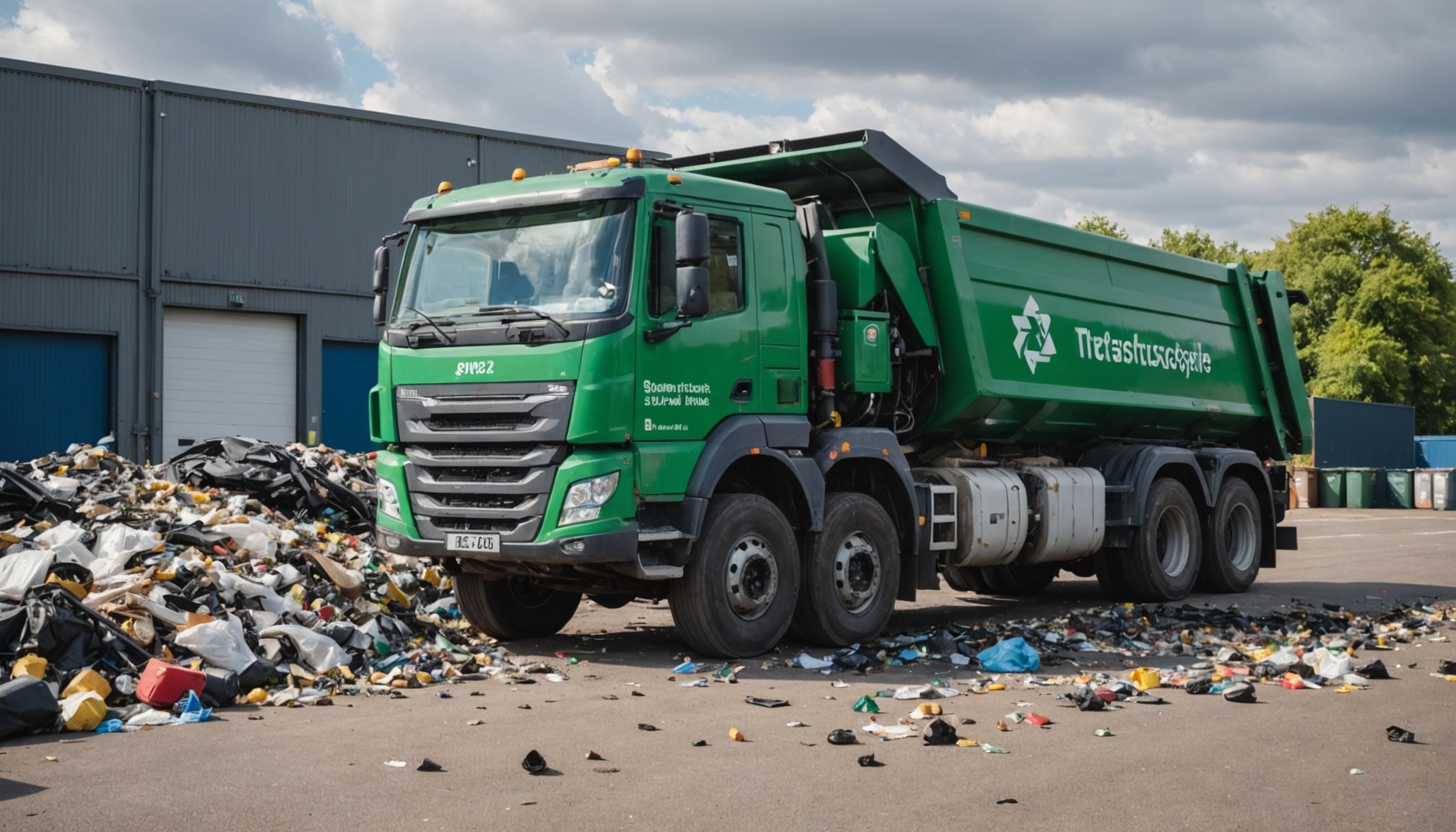Transforming Waste Management in the UK: Harnessing the Power of AI for Sustainable Solutions
The UK is at the forefront of a revolution in waste management, driven by the innovative use of Artificial Intelligence (AI). This transformation is not just about improving efficiency; it’s about creating a more sustainable, environmentally friendly, and circular economy. Here’s how AI is reshaping the landscape of waste management in the UK.
The Role of AI in Waste Management
AI is revolutionizing waste management through various applications, each designed to address different aspects of the waste cycle.
Also read : Unlocking success for uk independent musicians: a comprehensive guide to enhancing online visibility
Automated Waste Sorting
One of the most significant advancements is in automated waste sorting. Companies like Recorra are investing heavily in AI-powered robotic sorting arms. These arms, manufactured by Recycleye, use machine learning algorithms to identify and sort recyclable materials with unprecedented accuracy and speed.
- **Sorting Capacity**: The robotic arm can sort a minimum of 35 items per minute, with the potential to pick up to 60 items per minute[1].
- **Detailed Analytics**: An online dashboard tracks waste composition trends, providing real-time data on the materials entering the facility[1].
- **Enhanced Accuracy and Quality**: The advanced sensors and learning algorithms ensure that materials are correctly picked out, reducing contamination and producing high-quality recyclables[1].
This technology not only improves the efficiency and accuracy of sorting but also protects staff from the physically demanding and potentially hazardous task of manual sorting.
This might interest you : Exploring the benefits of modular housing: a smart solution to the uk”s urban housing crisis
Smart Collection Systems
AI is also being used to optimize waste collection schedules and routes. Sensorita, an Oslo-based startup, uses intelligent, data-driven sensors to measure waste levels in containers. These sensors, combined with machine learning algorithms, provide real-time data on fill levels, enabling informed decision-making about collection times and reducing unnecessary pickups[2].
- **Real-Time Data**: Sensors create a digital twin of the waste container, showing location, fill level, and soon, the actual contents of the skips[2].
- **Optimized Collections**: This data empowers customers to streamline distribution and optimize waste production[2].
Supporting a Circular Economy
The UK government is committed to transitioning to a circular economy, where resources are maximized, and waste is minimized. AI plays a crucial role in this transition.
Government Initiatives
The government has set ambitious targets, including reducing residual waste arisings by 50% by 2042 compared to 2019 levels. Key initiatives include Extended Producer Responsibility for packaging, Simpler Recycling schemes, and a Deposit Return Scheme for drinks containers[3].
- **Extended Producer Responsibility**: Encourages producers to take responsibility for the waste generated by their products[3].
- **Simpler Recycling**: Standardizes recycling practices across England, making it easier for people to recycle correctly[3].
- **Deposit Return Scheme**: Incentivizes the return of drinks containers, reducing litter and increasing recycling rates[3].
These reforms are expected to reduce annual municipal residual waste arisings by 18% by 2035, aligning with the goals of a circular economy.
AI in Food Waste Management
Food waste is a significant issue, but AI is helping to tackle it. For example, a grocery store chain in the UK used AI to track sales trends, reducing unsold perishable items by 35% and thereby saving costs and reducing food waste[4].
- **Sales Trend Analysis**: AI tools analyze sales data to predict demand, helping stores to stock more accurately[4].
- **Supply Chain Optimization**: AI optimizes the supply chain, ensuring that perishable items are distributed efficiently and reducing waste at the distribution level[4].
Smart Waste Bins and Urban Planning
Cities are adopting smart waste bins equipped with AI sensors that monitor fill levels and alert collection services when necessary. This approach prevents overflow and reduces unnecessary pickups, making waste collection more efficient.
- **Real-Time Monitoring**: AI sensors monitor fill levels in real-time, ensuring that collections are made only when needed[4].
- **Data-Driven Urban Planning**: AI analyzes waste generation patterns to identify areas with high waste production, enabling targeted interventions such as additional recycling facilities or public awareness campaigns[4].
Environmental Impact and Sustainability
The environmental impact of traditional waste management practices is significant, contributing to climate change, illegal dumping, and a substantial carbon footprint. AI-driven solutions are helping to mitigate these issues.
Reducing Carbon Footprint
By optimizing collection routes and reducing the number of collection trips, AI can significantly lower the carbon footprint associated with waste management.
- **Efficient Routes**: AI algorithms optimize collection routes, reducing fuel consumption and emissions[4].
- **Reduced Collections**: Smart bins and sensors reduce the frequency of unnecessary collections, further lowering emissions[4].
Minimizing Illegal Dumping
AI can help identify areas prone to illegal dumping through data analysis and predictive analytics, enabling targeted interventions to prevent such activities.
- **Predictive Analytics**: AI analyzes historical data to predict areas at risk of illegal dumping, allowing for proactive measures[4].
- **Public Awareness**: AI-driven insights can inform public awareness campaigns to educate communities about the importance of proper waste disposal[4].
Practical Insights and Actionable Advice
For those looking to implement AI solutions in waste management, here are some practical insights and actionable advice:
Invest in AI-Powered Sorting
Consider investing in AI-powered robotic sorting arms to enhance the efficiency and accuracy of your recycling processes.
- **Training Period**: Allow a training period for the robot to learn how to precisely pick different materials[1].
- **Versatility**: The robot can be re-trained to sort different materials as needs change, though this may take several weeks or months[1].
Implement Smart Collection Systems
Use AI-driven sensors to monitor waste levels in containers and optimize collection schedules.
- **Real-Time Data**: Ensure that your system provides real-time data on fill levels and container locations[2].
- **Automated Collection Orders**: Set up the system to automatically place collection orders when necessary[2].
Integrate AI into Urban Planning
Use AI to analyze waste generation patterns and integrate this data into urban planning initiatives.
- **Data Analysis**: Analyze waste generation patterns to identify high-waste production areas[4].
- **Targeted Interventions**: Implement targeted interventions such as additional recycling facilities or public awareness campaigns based on AI insights[4].
The integration of AI into waste management is a game-changer for the UK’s journey towards a sustainable future. From automated waste sorting and smart collection systems to supporting a circular economy and minimizing environmental impact, AI is transforming every aspect of waste management.
- **Sustainable Future**: AI is crucial for achieving a sustainable future by maximizing resource use and minimizing waste[3].
- **Efficiency and Accuracy**: AI enhances the efficiency and accuracy of waste sorting and collection, reducing the environmental impact of traditional practices[1][4].
- **Informed Decision Making**: Real-time data and predictive analytics enable informed decision-making, optimizing waste management processes[2][4].
As we move forward, it’s clear that AI will continue to play a pivotal role in creating a more sustainable, efficient, and environmentally friendly waste management system in the UK.
Table: Key Applications of AI in Waste Management
| Application | Description | Benefits |
|---|---|---|
| Automated Waste Sorting | AI-powered robots sort recyclable materials from waste streams. | Increased accuracy, reduced contamination, and enhanced efficiency[1]. |
| Smart Collection Systems | Sensors and AI algorithms optimize collection schedules and routes. | Reduced costs, emissions, and unnecessary pickups[2][4]. |
| Predictive Analytics | AI analyzes waste trends to forecast future demands and identify areas for improvement. | Informed decision-making, targeted interventions, and optimized waste systems[4]. |
| Food Waste Monitoring | AI tools monitor food production, distribution, and consumption to minimize waste. | Reduced food waste, optimized supply chain, and cost savings[4]. |
| Smart Waste Bins | AI sensors monitor fill levels and alert collection services when necessary. | Prevents overflow, reduces unnecessary pickups, and optimizes collection routes[4]. |
| Data-Driven Urban Planning | AI analyzes waste generation patterns to support urban planning initiatives. | Targeted interventions, additional recycling facilities, and public awareness campaigns[4]. |
Quotes
- “The AI-arm will improve the speed and accuracy of sorting through the recycling we receive at the MRF. This is due to the AI learning and robotics ability to work continuously without being damaged.” – Recorra[1]
- “Sensorita uses intelligent, data-driven sensors to accurately measure waste levels in open skips and large containers, providing a comprehensive real-time data view and inventory of each container.” – Sensorita[2]
- “We are determined to transition to a circular economy in the UK, where we maximise resource use and minimise residual waste arisings.” – UK Government[3]
By embracing AI in waste management, the UK is not only enhancing its environmental sustainability but also setting a precedent for other countries to follow in the pursuit of a more sustainable future.







